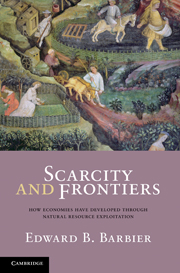
-
Select format
-
- Publisher:
- Cambridge University Press
- Publication date:
- 05 June 2012
- 23 December 2010
- ISBN:
- 9780511781131
- 9780521877732
- 9780521701655
- Dimensions:
- (228 x 152 mm)
- Weight & Pages:
- 1.3kg, 768 Pages
- Dimensions:
- (228 x 152 mm)
- Weight & Pages:
- 1.21kg, 768 Pages
You may already have access via personal or institutional login
Book description
Throughout much of history, a critical driving force behind global economic development has been the response of society to the scarcity of key natural resources. Increasing scarcity raises the cost of exploiting existing natural resources and creates incentives in all economies to innovate and conserve more of these resources. However, economies have also responded to increasing scarcity by obtaining and developing more of these resources. Since the agricultural transition over 12,000 years ago, this exploitation of new 'frontiers' has often proved to be a pivotal human response to natural resource scarcity. This book provides a fascinating account of the contribution that natural resource exploitation has made to economic development in key eras of world history. This not only fills an important gap in the literature on economic history but also shows how we can draw lessons from these past epochs for attaining sustainable economic development in the world today.
Reviews
‘In his masterly and timely book, Ed Barbier rescues the resource endowment from its surprisingly passive role in development economics. He details the succession of natural resources which Bagehot's ‘conquering swarm' of humanity has used to fuel its expansion. The pointers in the past from which a world of ecological scarcity may learn are fully revealed in this encyclopaedic study.'
Eric L. Jones - author of The European Miracle (2003) and Growth Recurring (2000)
‘Wide-ranging in time (from 10,000 BC to the present day) and space (with case studies drawn from many parts of the world), this is a major and path-breaking analysis of the role of natural resources and the expansion of populations into new frontiers in shaping the evolution of economic and social changes. Based upon extremely wide reading and a detailed knowledge of the issues, this book adds to our understanding of past events while providing suggestions for handling today's resource and climate problems.'
Stanley L. Engerman - University of Rochester
‘In this tour de force, Ed Barbier brings to bear the full weight of history on economics' age-old question about the significance of natural resource endowments for economic performance. Proceeding from the Paleolithic to the present, Barbier tests the ideas of natural-resource economics against the record of our species' efforts to make use of our environment. Economists, historians, and especially economic historians will learn from and admire this book for decades to come.'
John R. McNeill - University of Georgetown
‘Edward Barbier's interpretation of the economic history of nations, seen through the lens of natural resource exploitation, is not only bold but brilliantly executed. The scholarship is immense and the analysis is acute. This is a terrific piece of work.’
Sir Partha Dasgupta - University of Cambridge
‘Ed Barbier’s new book, Scarcity and Frontiers: How Economies Have Evolved through Natural Resource Exploitation, is vast in scope and remarkable in the breadth and depth of knowledge brought to bear on its central thesis - that the exploitation of natural resources and the expansion of frontiers in response to natural resource scarcity have been pivotal forces in the evolution of civilizations. Tracing long spans of pre-industrial history, Barbier demonstrates how expansion into unoccupied frontier areas provided the agricultural surpluses and natural resource raw materials needed to fuel economic growth in emerging civilizations. Particularly instructive are his comparisons between the fates of once powerful empires that failed to secure access to natural resource materials beyond their borders, and suffered economic stagnation and eventual decline as a consequence once their frontiers were closed, and the experience of western Europe, whose superior institutions of commerce and mastery of the seas enabled the exploitation of frontiers and natural resources globally and led to economic ascendancy during the age of exploration. Barbier’s aim in writing this book is no less sweeping in scope, to help present day civilizations learn from these experiences and better understand how to cope with the coming age of ecological resource scarcity. He has produced an indispensable contribution in pursuit of that goal.’
Robert T. Deacon - University of California, Santa Barbara
‘Ed Barbier has expanded his interest in problems of scarcity and marginalization in contemporary societies to a broadly based look at frontiers in a very long historical context, charting the interaction of economic growth and the resource frontier from the origins of settled agriculture to current concerns over the sustainability of expanding resource exploitation.’
Knick Harley - Oxford University
‘This book provides an ambitious re-interpretation of world economic history based on the notion of the frontier. Rather than a feature of US exceptionalism frontier expansion becomes central to explaining comparative historical development. This is a powerful and thought provoking work.’
James Robinson - Harvard University
Contents
Metrics
Altmetric attention score
Full text views
Full text views help Loading metrics...
Loading metrics...
* Views captured on Cambridge Core between #date#. This data will be updated every 24 hours.
Usage data cannot currently be displayed.
Accessibility standard: Unknown
Why this information is here
This section outlines the accessibility features of this content - including support for screen readers, full keyboard navigation and high-contrast display options. This may not be relevant for you.
Accessibility Information
Accessibility compliance for the PDF of this book is currently unknown and may be updated in the future.


